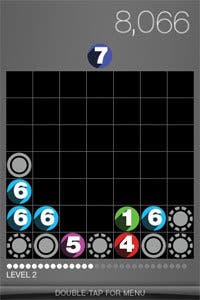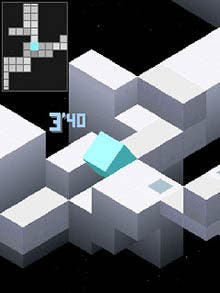iPhone Roundup
Drop7, EDGE, newtonica2 and Jetset.
At the end of 2008, we thought we'd try and do away with roundups. On the one hand, they're a useful way of picking through the games we might otherwise miss out. On the other hand, there's usually a good reason for missing them out, and if we're interested enough to write about something, why not give it a day in the sun?
With the iPhone, though, there's just no avoiding it. Not only are the games far more numerous than their DS and PSP counterparts, but they're often much cheaper and smaller, too, and the quality level is rising. The bigger and better ones will get their own reviews - everyone wave to Rolando! - but we want to get through as many of the good and interesting ones as possible, if only to justify the itemised App Store bills that keep piling up on my desk. So here's some of the stuff I've been obsessing over lately.
Drop7
- Developer: Area/Code
- Price: GBP 0.59 ("Special introductory rate")
- Download size: 5.3MB
Ever played Chain Factor? It's an addictive Flash game where you drop numbered discs to create stacks, and if the width or height of the stack matches any of the numbers on the discs it's made up of, those discs disappear. It's a thoughtful, well-executed spin on the usual colour- or shape-matching falling-blocks puzzler, and Drop7 is the same thing, give or take a few scoring details.

It does take a little while to get your head around, however, so let's do a couple of examples. Say you've got a line of six discs, and a disc with the number "7" appears at the top. By directing it to fall into the remaining gap to create a line of seven, it will immediately disappear - as will any 7s elsewhere in the line. This works horizontally or vertically, so unlike a lot of falling-blocks puzzle games you can actually delete buried discs by reaching the right height or width elsewhere.
This is also useful because a lot of discs are initially greyed out, and the only way to reveal their hidden number is by deleting two separate discs in adjacent positions (although rarely in the same move). Often this means going for buried discs, and once the grey disc's number is revealed, this often results in chain reactions, because if a 7 sheds its grey discy disguise in a line that's already that many discs wide, it disappears.
Also unlike a lot of its puzzly contemporaries, there's no time limit to pressurise you, and you only have to deal with one new disc at a time, but Drop7 does put the pressure on by introducing a horizontal line of grey discs beneath all the others every time you place a certain number of discs. The game's over when you run out of room at the top.
Initially it all seems a bit counterintuitive (not to mention complicated), but tactics gradually occur to you as you play (or not so gradually, presumably, if you're smarter than me), and you find yourself doing things like positioning numbers to create chains once the next grey line is introduced. You also learn not to do silly things like packing a bunch of 1s together in a corner halfway up the screen where they will be very hard to shift. It's just as important figuring out where not to place discs.
For 59p, it's a steal - and judging by the fact it had to be taken down and renamed late last year because of its similarity to Chain Factor, perhaps it is. Either way, I'm gradually becoming more dependent on it to murder boring train journeys, and like all the best puzzle games its simple rules disguise satisfying depth.
9/10
EDGE
- Developer: Mobigames
- Price: GBP 3.49
- Download size: 9.5MB
As the name suggests, Edge is a game about rolling a cube through mazes in the sky. Wait, that's not what the name suggests. Nevertheless, that's what you're doing. Perhaps instead the name refers to the ever-present danger of tumbling over the edge into the abyss. Should you do so, your cube respawns a few steps back at a very sympathetic checkpoint, with no harm obviously done, although "deaths" are counted against your overall ranking for the level.

Most likely, though, is that the name refers to the way you can roll your cube onto the top of any surface of the same height, pivoting by the top edge. As well as using this to climb over obstructions, players can latch onto the edge of a moving block and hang there while it crosses over otherwise perilous gaps. It's a good foil for puzzles, and the game's 26 levels gradually make more elaborate use of it, often in combination with precision rolls and switches that move other bits around.
Otherwise the chunky, diamond-cut levels are a mixture of obvious, gently tricky manoeuvres (past rows of prodding blocks set to knock you into space; between the teeth of moving, occasionally interlocking platforms) and cute spectacle: a sort of robot AT-AT walker that forms out of the platforms beneath you after the cube lands on a switch, which you operate by moving back and forth between adjacent switches. The idea is to collect smaller flashing cubes as you go and finish on a sparkly goal square.
However, the control and level design never quite live up to the premise. You can move the cube around by dragging your finger across the touch screen or by using the tilt sensor (with a toggle in the menu), but the cube often rumbles around faster than anticipated, and clinging onto moving blocks is unsympathetic. Any number of levels aren't really sure whether they're puzzles or twitch-fests, either, and the game becomes too reliant on doing swishy patterns with moving squares to make up for the scarcity of new ideas. Despite the presence of a mini-map to help with depth perception, the isometric graphics also get the better of you now and then.
In the end Edge is a promising idea inconsistently developed, and while I was happy to play it to the end, I could just as easily not have done. GBP 3.49 isn't a lot of money by console game standards, but adrift in an ocean of cheaper, frequently better games, it feels like a bit too much.
7/10

